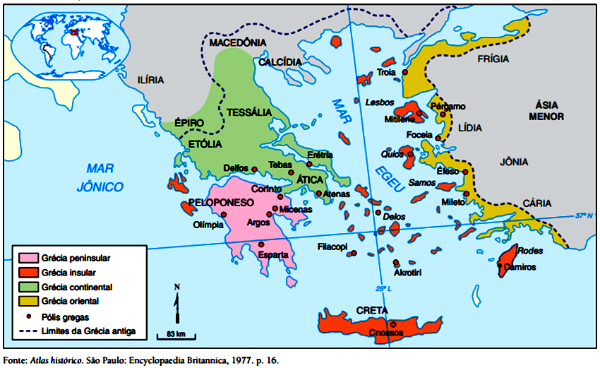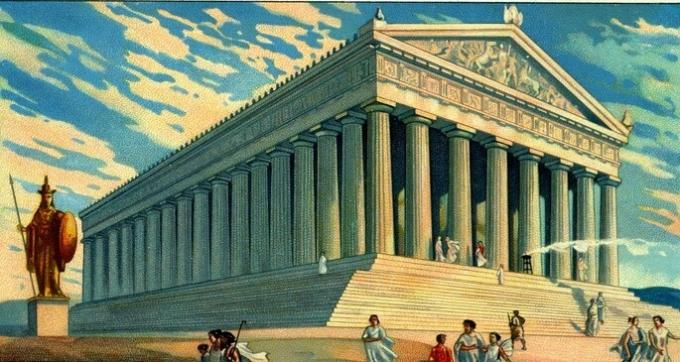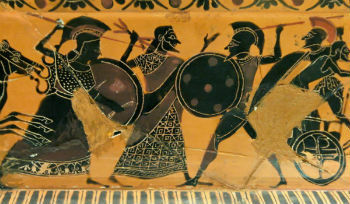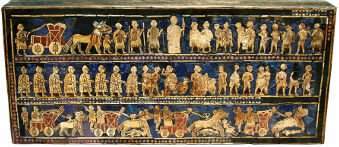Ancient Greece it is the time of Greek history that extends from century XX to century IV a. Ç.
When we talk about Ancient Greece we are not referring to a unified country, but to a group of cities that shared the language, customs and some laws.
Many of them were even enemies among themselves as was the case with Athens and Sparta.

Map of Ancient Greece
Politics
In the Classical Period, the Greeks sought to cultivate beauty and virtue by developing the arts of music, painting, architecture, sculpture, etc.
With this, they believed that citizens would be able to contribute to the common good. Thus, democracy was launched.
Democracy was the government exercised by the people, unlike the empires that were led by rulers who were considered gods, as was the case in the Egypt of the Pharaohs.
Democracy developed mainly in Athens, where free men had the opportunity to discuss political issues in the public square.
Society
Each polis had its own social organization and some, like Athens, admitted slavery, through debt or war. In turn, Sparta, had few slaves, but owned the state servants, who belonged to the Spartan government.
Both cities had a rural oligarchy that ruled them.
Also in Athens we see the figure of foreigners called metecos. It was only a citizen who was born in the city and therefore, foreigners could not participate in the political decisions of the polis.
Economy
The Greek economy was based on craft products, agriculture and trade.
The Greeks made choir, metal and fabric products. These were a lot of work, as all production steps - from spinning to dyeing - were time-consuming.
Crops were dedicated to vines, olive trees and wheat. To this were added the creation of small animals.
Trade took place between Greek cities on the shores of the Mediterranean and affected all Greek society. To carry out commercial exchanges, the currency was used "drachma".
There was both the small trade of the farmer, who took his harvest to the local market, and the big merchant, who owned boats that ran all over the Mediterranean.
Religion

Ancient Greek religion was polytheistic. Upon receiving the influence of various peoples, the Greeks were adopting gods from other places until to constitute the pantheon of gods, nymphs, demigods and heroes who were worshiped both at home and publicly.
The stories of the gods served as a moral teaching to society, and also to justify acts of war and peace. The gods also interfered with everyday life, and practically there was a deity for every function.
If a Greek were in doubt as to what action to take, he could consult the Delphic oracle. There, a Pythia would go into a trance in order to make contact with the gods and answer the question. As this was given in an enigmatic way, a priest would be in charge of interpreting it for the client.
Culture
Greek culture is closely linked to religion, as literature, music and theater told of the deeds of heroes and their relationship with the gods who lived on Olympus.
Theatrical plays were very popular and every city had its scenic space (called an orchestra) where tragedies and comedies were staged.
Music was important to brighten civil banquets and accompany religious acts. The main instruments were the flute, drums and harps. The latter was used to help poets recite their works.
Likewise, sports were part of everyday Greek life. Therefore, to celebrate the alliance between the different polis, competitions were organized in times of peace.
The first of them was realized in 776 a. C, in the city of Olympia and hence would be known as the Olympic Games, or simply, Olympics.
At that time, only free men who could speak Greek could take part in the competition.
Summary of Ancient Greek History
The history of Ancient Greece is divided into four periods:
- Pre-Homeric (20th - 12th century BC Ç.)
- Homeric (12th - VIII a. Ç.)
- Archaic (8th - 6th centuries a. Ç.)
- Classic (5th - 4th centuries a. Ç.)
Pre-Homeric Period (20th - 12th century BC Ç.)
The first period of formation in Greece is called pre-Homeric.
Ancient Greece was formed from the miscegenation of Indo-European or Aryan peoples (achaeans, Ionians, aeolians, dorians). They migrated to the region located in the south of the Balkan Peninsula, between the Ionian, Mediterranean and Aegean seas.
It is believed that around 2000 BC Ç. the Achaeans arrived, who lived in a regime of primitive community.
After establishing contact with the Cretans, from whom they adopted writing, they developed, built palaces and fortified cities.
They were organized into various kingdoms led by the city of Mycenae and hence the name Achaean Civilization of Mycenae. After annihilating the Cretan civilization, they conquered several islands in the Aegean Sea and destroyed Troy, a rival city.
However, in century XII a. C., the Mycenaean civilization was destroyed by the Dorians, who imposed a violent domination over the entire region, razed the cities of Hellas and caused the dispersion of the population, which favored the formation of several colonies. This fact is known as the 1st Greek diaspora.
See too: Pre-Homeric Period
Homeric Period (12th - VIIIth centuries a. Ç.)
The Doric invasions caused a setback in social and commercial relations among the Greeks.
In some regions the genos – community formed by numerous families, descendants of the same ancestor. In these communities, goods were common to all, work was collective, they raised cattle and cultivated the land.
Everything was divided between them, who depended on the orders of the community chief, called pater, who exercised religious, administrative and legal functions.
With the increase in population and the imbalance between population and consumption, the genos began to break down.
Many started to leave the genos and to look for better conditions of survival, starting the colonizing movement for a good part of the Mediterranean. This movement that marks the disintegration of the gentile system is called the 2nd Greek diaspora.
The process resulted in the foundation of several colonies, including:
- Byzantium, later Constantinople, and now Istanbul;
- Marseille and Nice, now in France;
- Naples, Tarentum, Sybaris, Crotona and Syracuse, known together as Magna Grecia, in southern Italy and in Sicily.
See too: Homeric Period
Archaic Period (8th - 6th centuries a. Ç.)
The Archaic Period begins with the decay of the Gentile community. At that moment, the aristocrats decided to unite creating the fraternity (brotherhoods formed by individuals of various genos).
These united forming tribes that built, on high ground, fortified cities called acropolis. Cities were being born - Greek States (polises).
Athens and Sparta served as models for the others greek polis. Sparta was an aristocratic city, closed to foreign influences and an agrarian city.
The Spartans valued authority, order and discipline and so it became a militaristic state where there was no room for intellectual achievement.
In turn, Athens dominated for a long time the trade between Greeks and, in its political evolution, knew various forms of government: monarchy, oligarchy, tyranny and democracy. Athens symbolized the cultural splendor of Ancient Greece.
See too: Archaic Period
Classical Period (5th - 4th centuries a. Ç.)

The beginning of the Classic Period was marked by the Medical Wars, between the Greek cities and the Persians, which threatened the commerce and security of the polis.
After the wars, Athens became the leader of the Confederation of Delos, an organization made up of several city-states. These were to contribute ships and money to maintain naval resistance against a possible foreign invasion.
The period of Athenian hegemony coincided with the economic prosperity and cultural splendor of Athens. At this time, philosophy, theater, sculpture and architecture reached their greatest grandeur.
Intending to also impose its hegemony in the Greek world, Sparta composed with other city-states the League of the Peloponnese and declared war on Athens in 431 a. Ç. After 27 years of struggle, Athens was defeated.
Years later, Sparta lost hegemony to Thebes and during this period, Greece was conquered by Macedonian armies and incorporated into the Macedonian Empire. This epoch became known as the Hellenistic period.
Greece was ruled by Emperor Philip II and then by his son Alexander the Great, who conquered a great empire. The fusion of Greek and Oriental culture was called Hellenistic Culture.
These texts can help you in your studies about Greece:
- Exercises on Ancient Greece
- The Origin of Philosophy
- ancient philosophy
- Aristocracy
- Greek gods
- Greek Theater
Bibliographic references
Greece: Crucible of Civilization (Documentary)
Greek Civilization (UFTPR Personal Page)
All About Greek Mythology (Superinteressante Magazine)

